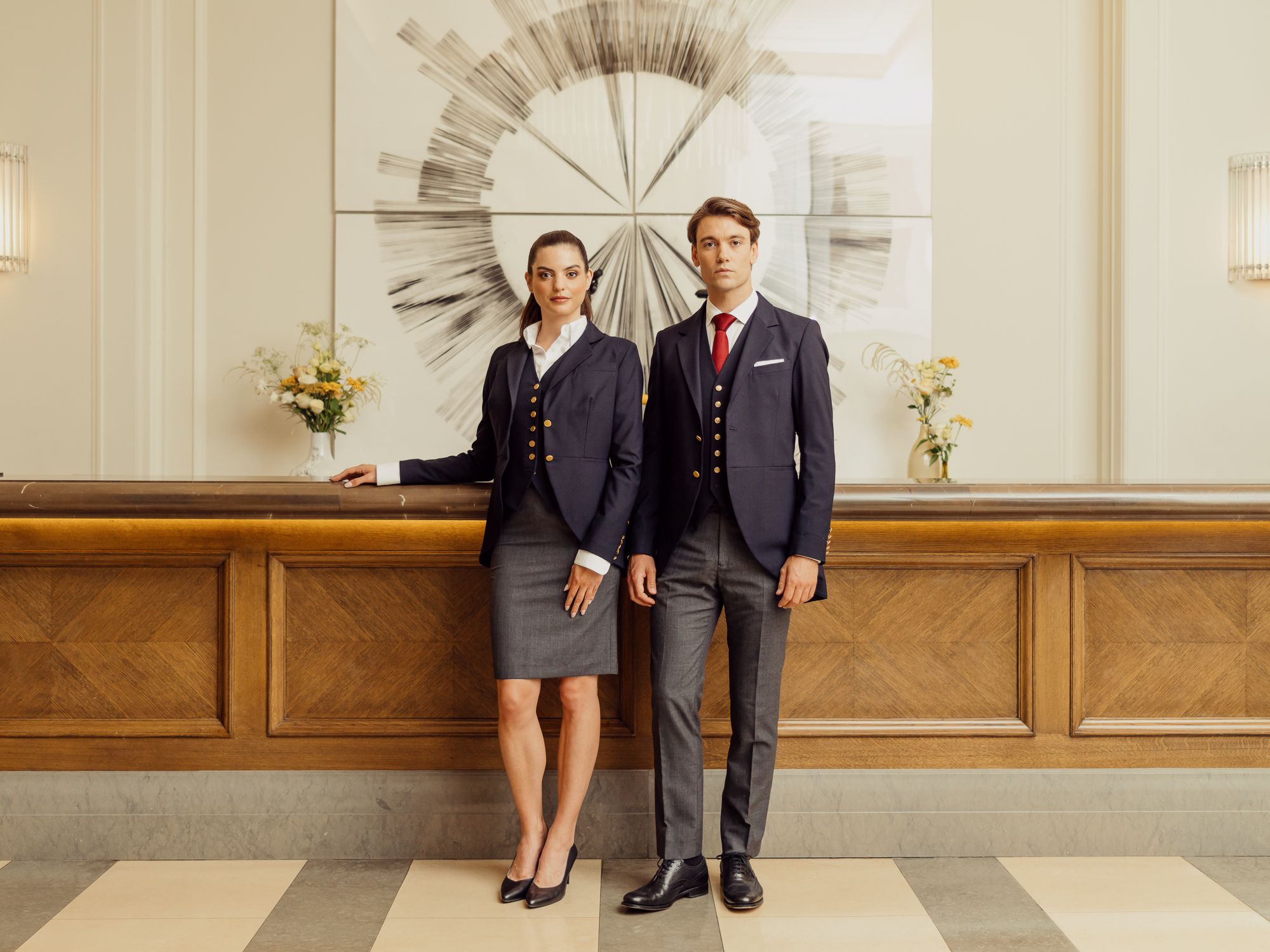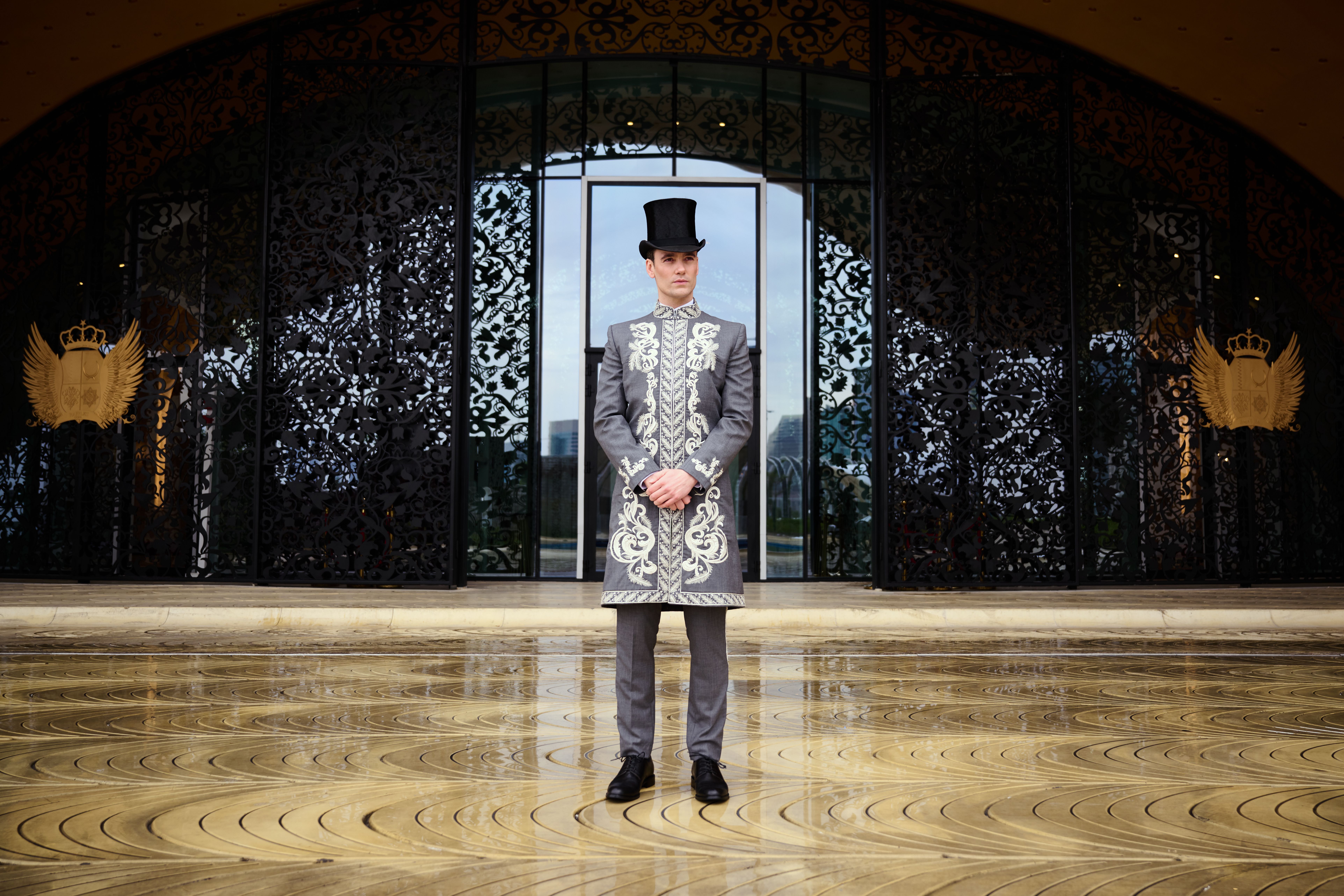Nicholas Oakwell on inclusive design, fighting fast fashion and keeping comfort at the heart of hospitality uniform design
Independent Hotel Show London meets designer Nicholas Oakwell, Founder of NO Uniform to learn about his career in fashion and pivoting to hospitality uniform design.
Designing uniforms for the hospitality industry is a complex process that involves more than just selecting colours and materials. It's about fostering a sense of belonging among employees, ensuring teams are safe and comfortable, and acting as shorthand for the business's identity and brand values. NO Uniform, led by Founder Nicholas Oakwell, launched in 2002 and quickly became a leading designer for uniforms at top hotels in the UK and around the world.
.jpg)
Tell us about your career in the design world
I studied fashion after leaving school as I knew I wanted to be a couture designer. There was something about couture that really resonated with me. I was eager to
learn the craft of clothes and how I could turn my visions into garments.
In one of the modules, millinery, I was taught by Shirley Hex who also mentored Stephen Jones and Philip Tracy who graduated the year after me. I gravitated to this as it was learning a craft and using my hands. I left my degree with Harvey Nichols buying my collection of 16 hats that were based on the Covent Garden flower market. By end of the season, Harvey Nichols had sold 40 units.
I was now a milliner, making hats for London and European designers, as well as working on my own label selling to UK, Europe, New York, Japan, Hong Kong and Australia. I closed the business after three years employing eight staff and not knowing a thing about business – I was only 23!
I then worked for Danish couture designer for six years starting in the workroom. I was promoted to head of workroom then head of operations. Here was my learning time for couture. I was lucky to work with artisans that had worked in Dior Chanel Valentino couture workrooms. To be honest, I loved this time, as couture was starting to be seen differently.
Galliano was at Dior, McQueen at Givenchy, were breathing fresh air into the industry – actually, it was more of an explosion. From there I was in two minds whether or not to go to Paris, to be a workroom assistant in a couture house and climb the ladder, or continue working for Harvey Nichols in charge of the workroom and my own label. I decided to stay at Harvey Nichols because I wanted to see the other side of the process, plus I knew the brand well. They allowed me to undertake many training courses in topics such as financing departments, health and safety, HR and marketing. On reflection, these lessons set me up to run a business – I think of that era as my business education.
Whilst there, a friend asked me to design some uniforms for a boutique hotel in Chelsea, which was not conflict to Harvey Nichols, so there I was, working on my first hotel, which sheltered a staff of just 45 people. So, NO Uniform was born in 2002. I spent nine months painstakingly designing, sampling, manufacturing and installing the uniforms for the Great Eastern Hotel. From that hotel, I was asked to design the uniforms at The Goring and Browns Hotel, and it all just snowballed from there.
I was still working on my couture collection at this time and opened a store on Brook Street that really was a window into the world of couture – it was immeasurable to have a presence like that in Mayfair.
Nicholas Oakwell Couture continued alongside the uniform business but as the uniform side grew so much it was hard to keep up with couture and I decided to hit pause on this for the time being and grow NO Uniform but with couture always in the back of my mind.
What prompted the launch of NO Uniform, and how does the company stand out from the competition?
I was working at Harvey Nichols managing the workrooms. I was approached by a friend whom was a food and beverage consultant to design uniforms for a boutique hotel in Chelsea, My Hotel. I designed and delivered the uniforms, at the party approached by the manager of the Great Eastern Hotel, and offered me to design the uniforms for the hotel. I said, I don’t design uniforms I am a fashion designer, she replied I can pay £250k for 200 people…I said yes, I design uniforms!! I resigned and opened NO Uniform a few months later. I love hotels, bars, and restaurants, so to be able to design clothes in these environments is amazing, clothes and hospitality a dream role.
In regards to standing out from the competition, we really try to understand the brand, demographics, customer base, as well as thinking outside the box to give something unique to our clients. We are constantly striving, using new fabrics and technologies. We very much believe we are only as good as our last project.
How has the world of fashion changed since the company launched?

Consumption is one of the biggest changes I have seen since launching my company. There was a huge boom towards fast fashion and trends that is the opposite of how we work in the hospitality sector. I am glad to say that with social media and consumers becoming much more sustainably minded, especially the younger generation this is taking a shift. This meant however that people were always looking for the next trend in fashion straight away whereas before it would have filtered to the stores maybe a season or two later. The fast fashion brands were able to create similar garments almost overnight taking away from the creativity and craftsmanship of the big design houses' work.
I am seeing people start to be smarter with money and invest in better quality pieces that have seen the luxury sector grow again in the last couple years.
What do you have to keep in mind when designing for hospitality professionals?
The most important thing is that the uniforms make the individual wearing them look great. Remember, these people are wearing the uniforms from 8 to sometimes 12 hours a day, we want them to feel great, but also the importance of these uniforms being functional and comfortable.
Are there any design trends that particularly excite you in 2024, and how can they be incorporated into designs that may have to last for years?
I hate trends. For uniforms to be approached like this, it is already a mistake. We all know trends disappear, while style remains. I keep away from trends and create a style, and work with the style of the brand, and evolve it.

What are some of the hotels you work with in the UK?
Previous projects in the UK include Claridge’s, Rosewood London, Corinthia London and The Goring Hotel. Upcoming projects include Mandarin Oriental Mayfair and Red Carnation Edinburgh.
How does sustainability influence the world of uniform design?
Sustainability is very much at our forefront. From the very beginning of sourcing our fabrics, and trims, we try and work with supply chains who consider sustainability. The longevity of the uniform is equally as important.
We use recycled hangers, made from carboard, avoid plastic as much as possible, and we collect old uniforms from clients in which we donate them to be reused in the making of new fabrics, mattresses, fleeces, but also donating them to universities to use the scrap fabric in fashion design.

How do you approach gender and other forms of inclusivity in your designs?
There has been a notable shift towards more inclusive designs in recent years. This trend is driven by the recognition of the diverse gender identities and expressions within society, as well as the desire to promote equality and inclusivity in all aspects of life, including attire. Gender-neutral uniforms often feature minimalist designs, simple silhouettes, and neutral colour palettes that transcend traditional gender norms. Many hospitality owners are actively revising their uniform policies to ensure they are inclusive and respectful of all individuals, regardless of gender identity.
We have been dressing gender fluid people for years, and we address each case personally, as each case needs to be.
)
)
)
)
)
)
)
)
)
)
)
)
)
)
)
)
)
)
)
)
)
)
)
)
)
)
)
)
)
)
)
)
)
)
)
)
)
)
)
)
)
)
)
)
)
)
)
)
)
)
)
)
)